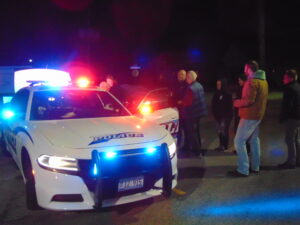Belvidere Citizen’s Police Academy: Part 3
By Anne Eickstadt
Editor

ANNE EICKSTADT PHOTO Belvidere Daily Republican
The Citizen’s Police Academy class checks out Officer Jones’ vehicle.
The topic of this week’s class is Traffic Enforcement. Officer Steven Jones has been a field training officer for over 16 years. “I do almost everything they ask me to do,” he said. He then gave us an extensive list of everything he does for the BPD, which included not only training duties, but also the youth Explorer Program and the Honor Guard Casket Team.
“One thing that keeps you safe is traffic stops,” Jones said. “Public safety is the main reason for traffic enforcement. We go out and make sure people are slowing down. We are able to be proactive. Traffic enforcement is a way to be alert and be seen by the public. It is a way to deter crime. For violators there are consequences in place, such as fines, license revoking, and mandatory driver ed courses similar to those provided by this traffic school Florida, for instance.
“It’s not about the money. The state has a formula: a large percentage goes to the state, some goes to the department and the rest is already apportioned to others. We write citations to deter bad driving. Sometimes we make stops for a criminal investigation. If something is going on, we will be asked to check someone out and find out what we can.
“If you have ever wondered why a traffic stop takes so long, it is because we have to check driver’s license information, vehicle registration, and complete our paperwork at the same time we are being alert and looking around to make sure no one is coming up behind us.
“If you are stopped, do exactly what you are asked to do. Stop immediately or we will wonder why not and what is going on. Put your hands on the wheel and don’t fumble around in your bag or the glove compartment. We will wonder if you are reaching for a gun or a knife or trying to hide something.
“Put the window down, be polite and respectful. If you are an honest citizen, there is no need to be rude, we are just trying to keep you safe. A traffic stop can be done in 15 or 20 minutes. If you have a concealed carry license, tell the officer so and where your gun is.
“Traffic stops are the most dangerous thing an officer can do. We’re coming up blind. We don’t know what you are doing or what is in the car. We do not want the worst to happen but we are prepared in case it does. Nine times out of ten we are dealing with ordinary people doing ordinary things.”
Officer Jones then told us about a new officer he was training. They saw a car driving a little erratically and decided to pull it over to make sure everything was okay. The car did not stop and the new officer was reporting on the radio to let the department know what was happening and told them they had a ‘car chase.’ “We don’t have a car chase,” Officer Jones told him. “This is not a car chase.”
Then Jones pointed out that the windows were all rolled up and the air conditioning was probably blasting since it was a hot day. There was a gray haired man in the passenger seat talking to the driver who couldn’t be seen from behind. “It’s a driver’s training session,” he told his trainee. “Do NOT pull out your gun when you approach the car.” Sure enough, grandpa was taking the teenager for some time behind the wheel. The radio and the air conditioning was blasting, the kid was nervous, and he couldn’t hear the siren until grandpa noticed what was happening and told him to pull over and stop.
Officer Jones then showed pictures of a couple of traffic accidents and explained how those pictures could be used during a crash investigation to determine
For complete article, pick up the Feb. 28 Belvidere Daily Republican.


